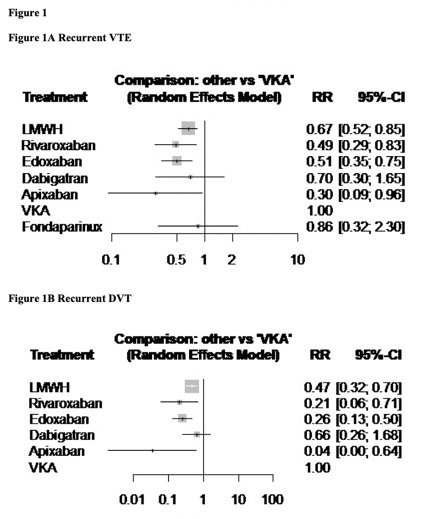Background: Cancer-associated thrombosis (CAT) is a common complication in patients with malignancy. Management of venous thromboembolism (VTE), in these patients, is challenging due to the high risk of recurrence and inherent risk of bleeding in this population. Direct oral anticoagulants (DOACs) have emerged as a treatment options for CAT. As yet there have not been head to head comparisons of these agents, by using a network meta-analysis we sought to compare the safety and efficacy profile of different long-term anticoagulation agents including DOACs in patients with CAT.
Methods: We searched MEDLINE and EMBASE from inception to November 2019 for studies comparing the effect of different long-term anticoagulation strategies for VTE in patients with cancer. We performed a network meta-analysis comparing the antithrombotic strategies in the selected studies using random-effects model. The outcomes analyzed were recurrent VTE (deep venous thrombosis [DVT] + pulmonary embolism), recurrent DVT, recurrent pulmonary embolism, all-cause mortality, major bleeding, and clinically relevant non-major bleeding.
Results: We identified a total of 20 studies (9 randomized control trials [RCTs] and 11 subgroup analyses from other unique RCTs) included for this analysis. Seven anticoagulation strategies were to be compared. We included low molecular weight heparin [LMWH], vitamin K antagonist [VKA], fondaparinux, as strategies while each of the DOACs; apixaban, rivaroxaban, edoxaban [Xa inhibitors], and dabigatran [direct thrombin inhibitor]) were individually analyzed. We found that LMWH and the Xa inhibitors were associated with a decreased risk of recurrent VTE and DVT compared to VKA (Figures 1A, and 1B), but dabigatran was not. Moreover, edoxaban showed a significant decreased risk of recurrent DVT compared to LMWH (relative risk 0.44, 95% confidence interval 0.32-0.94). Overall there was no significant difference in recurrent DVT among DOACs. There were no significant differences in recurrent pulmonary embolism, all-cause mortality, major bleeding, and clinically relevant non-major bleeding among all anticoagulation strategies.
Conclusions: In patients with CAT, LMWH and Xa inhibitors showed a decreased risk of recurrent VTE and DVT compared to VKA without increased risk of bleeding. Recurrent VTE was similar among each DOAC and LMWH. Edoxaban demonstrated a significant decreased risk of recurrent DVT compared to LMWH.

